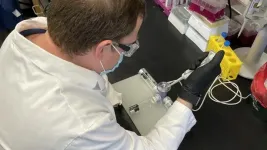(Press-News.org) An innovative cell-based treatment for cancer has been found promising for the control of infections caused by fungi. A study published in the journal Cytotherapy reports that the use of CAR (chimeric antigen receptor) T-cells programmed to “recognize” Cryptococcus spp. fungi was effective in combating infection in vitro and in mice.
C. gattii and C. neoformans are present in soil with dead organic matter and places contaminated by the droppings of pigeons and other birds. They cause systemic mycoses in the human organism. They can infect the lungs and central nervous system, causing meningitis or meningoencephalitis. The symptoms vary according to the site of the infection, which can be fatal. Transmission occurs by inhalation of the fungi.
About 1 million cases of Cryptococcus infection are reported worldwide every year, according to the US Centers for Disease Control and Prevention (CDC). The mortality rate ranges from 20% to 70%, and 220,000 cases of cryptococcal meningitis occur annually, affecting mainly people living with HIV-AIDS.
To escape the host’s immune response, Cryptococcus covers itself in a capsule made up primarily of glucuronoxylomannan (GXM), a polysaccharide considered its main virulence factor. It is difficult for the human immune system, especially T CD4+ and T CD8+ cells, to recognize and prevent the infection.
In the study, the group redirected T CD8+ cells to target the GXM in the capsule via expression of a GXM-specific CAR, in order to have the cells recognize the pathogen directly and contain its growth.
“The findings show that GXMR-CAR T-cells can be redirected to recognize C. neoformans. Future studies will focus on determining the therapeutic efficacy of such cells in an animal model of cryptococcosis,” the authors conclude in the article.
The first author is Thiago Aparecido da Silva, a Brazilian researcher affiliated with the University of São Paulo’s Ribeirão Preto Medical School (FMRP-USP). In an interview given to Agência FAPESP, Silva explained that the infusion of GXMR-CAR T-cells not only contained the fungus’s growth but also reduced the number of so-called titan cells that make the infection more virulent. These are abnormally large yeast cells with a diameter of more than 45 micrometers.
Silva is a researcher in FMRP-USP’s Department of Cellular and Molecular Biology and Pathogenic Bioagents (Biocel) and is supported by FAPESP via a postdoctoral fellowship and a research internship abroad.
“This reduction in titan cells points to a good prognosis for new treatments for cryptococcosis,” Silva said. “CAR T-cells can be used to treat other fungal infections and can be associated with conventional drugs to reduce their side-effects. CAR T-cells can establish immune memory and protect the patient against reinfection by invasive fungi.”
Silva is now working on ways to optimize the protective response of CAR T-cells to fungal disease, including infections caused by Candida albicans and Histoplasma capsulatum, with support from FAPESP via a Young Investigator Grant.
Direct death of fungi
Researchers at MD Anderson Cancer Center in Texas (USA) who collaborate with Silva were the first to explore the direct death of fungi from redirected T CD8+ cells with a CAR targeting a carbohydrate found in the cell wall of Aspergillus fumigatus.
Interest in the use of CAR T-cells to treat cancer and other diseases has increased in several countries. In most studies involving the technique, the researchers targeted the antigen CD19 to contain multiplication of abnormal B-cells causing lymphoma or other kinds of severe disease (read more at: agencia.fapesp.br/31675).
CAR T-cell therapy in various forms has been approved since 2017 by the US Food and Drug Administration (FDA), especially to treat leukemia and lymphoma.
In Brazil, a group of researchers at the Center for Cell-Based Therapy (CTC), hosted by FMRP-USP, tested this innovative cancer treatment with reprogrammed cells from the patient for the first time in 2019. CTC is a Research, Innovation and Dissemination Center (RIDC) supported by FAPESP.
The technique was used to treat an advanced case of diffuse large B-cell lymphoma (DLBCL), a type of non-Hodgkin lymphoma (read more at: agencia.fapesp.br/31675). In February 2020, CDC launched a book with practical information on the production of CAR T-cells.
Target recognition
Silva and the other authors of the latest study raise the hypothesis that redirecting GXMR-CAR T-cells induces cytotoxic activity against fungi that express GXM in the cell wall. The study shows that modified human T-cells expressing GXMR-CAR were capable of binding to GXM in vitro and interacting with the yeast form of C. neoformans.
“The most critical part of the construction of a CAR is the target recognition portion, in which we use monoclonal antibodies that interact with Cryptococcus,” Silva said. “We use the DNA sequence that encodes the part of the antibody that recognizes the fungus and combine it with the DNA sequence that encodes the other portions of the CAR.”
INFORMATION:
About São Paulo Research Foundation (FAPESP)
The São Paulo Research Foundation (FAPESP) is a public institution with the mission of supporting scientific research in all fields of knowledge by awarding scholarships, fellowships and grants to investigators linked with higher education and research institutions in the State of São Paulo, Brazil. FAPESP is aware that the very best research can only be done by working with the best researchers internationally. Therefore, it has established partnerships with funding agencies, higher education, private companies, and research organizations in other countries known for the quality of their research and has been encouraging scientists funded by its grants to further develop their international collaboration. You can learn more about FAPESP at http://www.fapesp.br/en and visit FAPESP news agency at http://www.agencia.fapesp.br/en to keep updated with the latest scientific breakthroughs FAPESP helps achieve through its many programs, awards and research centers. You may also subscribe to FAPESP news agency at http://agencia.fapesp.br/subscribe.
With a relatively minor genetic change, a new treatment developed by researchers at the Georgia Institute of Technology and Emory University appears to stop replication of both flu viruses and the virus that causes Covid-19. Best of all, the treatment could be delivered to the lungs via a nebulizer, making it easy for patients to administer themselves at home.
The therapy is based on a type of CRISPR, which normally allows researchers to target and edit specific portions of the genetic code, to target RNA molecules. In this case, the team used mRNA technology to code for a protein called Cas13a that destroys parts of the RNA genetic code that viruses use to replicate in cells in the lungs. It was developed by researchers in ...
UNIVERSITY PARK, Pa. -- While women can be drawn into farming for many reasons, researchers in Penn State's College of Agricultural Sciences have found that female-owned farms in the U.S. are more common in areas that are closer to urban markets, that engage in agritourism activity, and that offer greater access to childcare.
The number of farms operated by women has risen over the past two decades, said Claudia Schmidt, assistant professor of marketing and local/regional food systems.
The U.S. Department of Agriculture changed the way it counts the operators of farms in its most recent Census of Agriculture, allowing for up to four principal operators per farm. This has inflated the number of ...
COVID-19 is only the latest infectious disease to have had an outsized impact on human life. A new study employing ancient human DNA reveals how tuberculosis has affected European populations over the past 2,000 years, specifically the impact that disease has had on the human genome. This work, which publishes March 4 in the American Journal of Human Genetics, has implications for studying not only evolutionary genetics, but also how genetics can influence the immune system.
"Present-day humans are the descendants of those who have survived many things--climate changes and big ...
To succeed in mating, many male frogs sit in one place and call to their potential mates. But this raises an important question familiar to anyone trying to listen to someone talking at a busy cocktail party: how does a female hear and then find a choice male of her own species among all the irrelevant background noise, including the sound of other frog species? Now, researchers reporting March 4 in the journal Current Biology have found that they do it thanks to a set of lungs that, when inflated, reduce their eardrum's sensitivity to environmental noise in a specific frequency range, making it easier to zero in on the ...
Brain cells called astrocytes derived from the induced pluripotent stem cells of patients with bipolar disorder offer suboptimal support for neuronal activity. In a paper appearing March 4th in the journal Stem Cell Reports, researchers show that this malfunction can be traced to an inflammation-promoting molecule called interleukin-6 (IL-6), which is secreted by astrocytes. The results highlight the potential role of astrocyte-mediated inflammatory signaling in the psychiatric disease, although further investigation is needed.
"Our findings suggest that IL-6 may contribute to defects associated with bipolar disorder, opening new avenues for clinical intervention," says co-senior study author Fred Gage ...
New collaborative research from Northwestern University and Lund University may have people heading to their backyard instead of the store at the outset of this year's mosquito season.
Often used as an additive for cat toys and treats due to its euphoric and hallucinogenic effects on cats, catnip has also long been known for its powerful repellent action on insects, mosquitoes in particular. Recent research shows catnip compounds to be at least as effective as synthetic insect repellents such as DEET.
But until now, the mechanism that triggered insects' aversion to this common member of the mint family was unknown. In a paper ...
Existing gene drive technologies could be combined to help control the invasive grey squirrel population in the UK with little risk to other populations, according to a modelling study published in Scientific Reports.
Gene drives introduce genes into a population that have been changed to induce infertility in females, allowing for the control of population size. However, they face technical challenges, such as controlling the spread of altered genes as gene drive individuals mate with wild individuals, and the development of genetic resistance, which may render the gene drive ineffective.
To address these challenges, Nicky Faber and colleagues used computer modelling to investigate the effectiveness of a combination of three gene ...
Using theoretical models of bacterial metabolism and reproduction, scientists can predict the type of resistance that bacteria will develop when they are exposed to antibiotics. This has now been shown by an Uppsala University research team, in collaboration with colleagues in Cologne, Germany. The study is published in the journal Nature Ecology and Evolution.
In medical and pharmaceutical research, there is keen interest in finding the answer to how fast, and through which mechanisms, bacteria develop antibiotic resistance. Another goal is to understand how this resistance, in turn, affects bacterial growth and pathogenicity.
"This kind of knowledge would enable better tracking and slowing ...
Induced pluripotent stem cells (iPSC) are suitable for discovering the genes that underly complex and also rare genetic diseases. Scientists from the German Cancer Research Center (DKFZ) and the European Molecular Biology Laboratory (EMBL), together with international partners, have studied genotype-phenotype relationships in iPSCs using data from approximately one thousand donors.
Tens of thousands of tiny genetic variations (SNPs, single nucleotide polymorphisms) have been identified in the human genome that are associated with specific diseases. Many of these genetic variants are ...
A team of scientists from the University of Cologne (Germany) and the University of Uppsala (Sweden) has created a model that can describe and predict the evolution of antibiotic resistance in bacteria. Resistance to antibiotics evolves through a variety of mechanisms. A central and still unresolved question is how resistance evolution affects cell growth at different drug concentrations. The new model predicts growth rates and resistance levels of common resistant bacterial mutants at different drug doses. These predictions are confirmed by empirical growth inhibition curves and genomic data from Escherichia coli populations. ...


